In this article:
Several hair care products are formulated to nourish and prevent hair damage resulting from dryness, pollution, and other factors. In fact, the market is flooded with such products, from shampoos and conditioners to serums, colorants, and sprays.
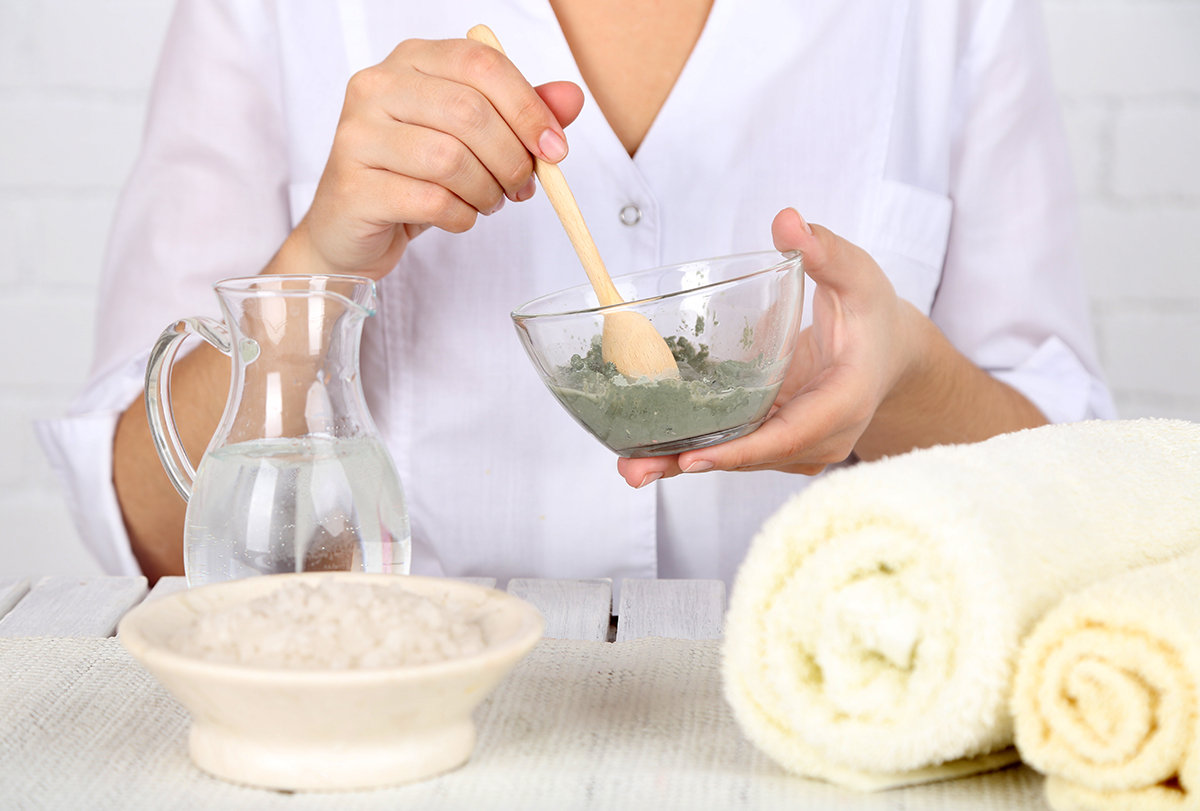
Bentonite is an organic colloidal clay replete with minerals that can do wonders for your skin and hair. It mainly consists of sodium and calcium montmorillonites, which both fall in the smectite category. Smectite minerals rapidly absorb water and expand up to eight times their original size, but this may vary from clay to clay.
Bentonite is found in places where volcanic ash has settled in the ground, especially under. This ash contains volcanic glass that breaks down into clay minerals when exposed to water over a prolonged period.
The clay is mined and sun-dried before being packaged for commercial purposes. (1) It is a commonly used ingredient in a number of skin and hair products, which points to its efficacy.
This article will focus on the hair benefits of bentonite and how to use it in DIY hair masks that aim to cleanse, moisturize, and repair dull, damaged tresses.
Know the Ingredients
Every ingredient used in the bentonite mask benefits the skin in its own way:
1. Bentonite clay
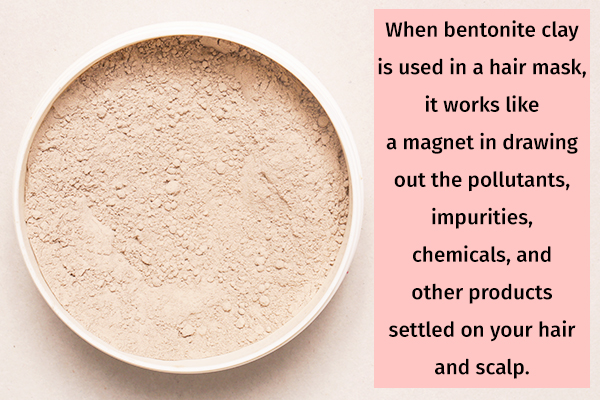
Bentonite clay is anionic, which means it carries a negative electric charge. As rules of physics go, it naturally attracts cationic substances that carry a positive electric charge.
When used in a hair mask, it works like a magnet, drawing out the pollutants, impurities, chemicals, and other products settled on your hair and scalp. When you rinse out the clay mask, all the toxins get washed away with it. (2)
This deep cleansing effect unclogs the hair follicles so that they can absorb nutrients and water for healthy hair growth. Clean, nourished hair is bound to be more lustrous, which is a great plus.
But there is more to bentonite than just its detoxifying effects. It contains essential hair-building minerals, including sodium, potassium, and calcium. It is also a strong antimicrobial that helps fight and prevent scalp infections.
Bentonite soothes scalp irritation and flaking, especially in people suffering from inflammatory skin conditions such as psoriasis and seborrheic dermatitis. Lastly, bentonite hair masks can make your unruly locks more manageable by reducing frizz and improving curl definition.
Disclaimer: One gram of bentonite clay contains up to 37.5 micrograms of lead, which can seep into your skin and then enter your bloodstream. In fact, nearly 23% of the lead used topically on the skin can potentially reach the bloodstream. So, repeated application of bentonite clay runs the risk of causing lead toxicity, but so far no such negative reactions have been reported.
Topical bentonite is generally considered safe, but people who are sensitive to lead or susceptible to lead toxicity must consult a doctor before making it part of their skin care. Also, everyone should conduct a patch test before trying out any new topical ingredient to rule out possible allergies.
2. Apple cider vinegar

Apple cider vinegar (ACV) is credited with strong antimicrobial activity that can help ward off scalp infections.
The acidic nature of ACV also renders the scalp environment inhospitable for microbial growth. It is a weak acid with a low pH that coats the hair shaft and shrinks its outermost layer (cuticle) so that it becomes tight and impervious. This helps reduce moisture loss from your hair.
ACV also helps relieve the itching, irritation, and flakiness associated with dandruff, psoriasis, and seborrheic dermatitis. It can also add a healthy shine to hair.
3. Coconut oil

Coconut oil is richly endowed with saturated fats, vitamins, and antioxidants that benefit the hair in different ways. (3)
This oil also has a low molecular weight, which allows it to seep into the hair shaft. In fact, it is one of the most absorbent hair oils there is. It penetrates the shaft to moisturize it from within but also forms a protective layer over it to prevent protein breakdown by external irritants.
You can use coconut oil daily for hair conditioning without the risk of side effects associated with most commercial products. Moreover, rubbing it on your scalp helps enhance blood flow to the hair follicles for improved hair growth.
4. Castor oil
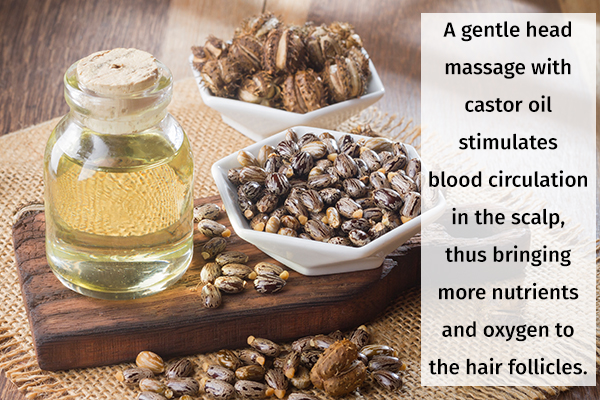
Castor oil is enriched with ricinoleic acid and omega-6 fatty acids (4) that hydrate both hair and scalp.
A gentle head massage with this oil stimulates blood circulation in the scalp, thus bringing more nutrients and oxygen to the hair follicles. The improved nourishment promotes healthier, thicker, and faster hair growth.
Castor oil also binds the moisture to the hair for long-lasting hydration. It also works as an antimicrobial agent to banish scalp infections such as dandruff.
5. Sweet almond oil
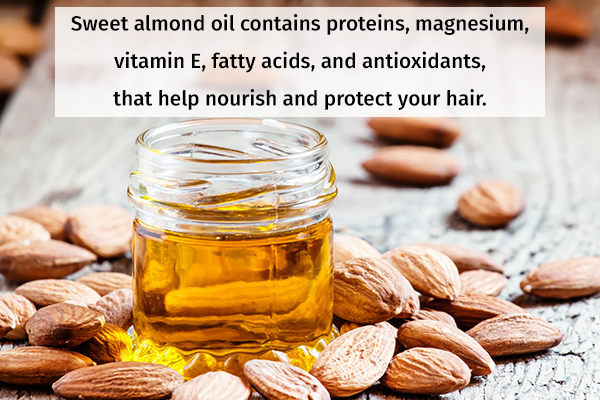
Sweet almond oil contains proteins, magnesium, vitamin E, fatty acids, and antioxidants (5) that nourish and protect hair.
Protein and magnesium are key hair-building nutrients that help the tresses go longer and stronger. Fatty acids impart moisture to your hair and lock it in for a soft, smooth, and shiny finish.
Antioxidants such as vitamin E help counteract the activity of free radicals that cause a great deal of hair damage. Thus, this single ingredient helps condition the hair while also fighting hair fall and breakage.
Bentonite Clay Hair Mask Recipe
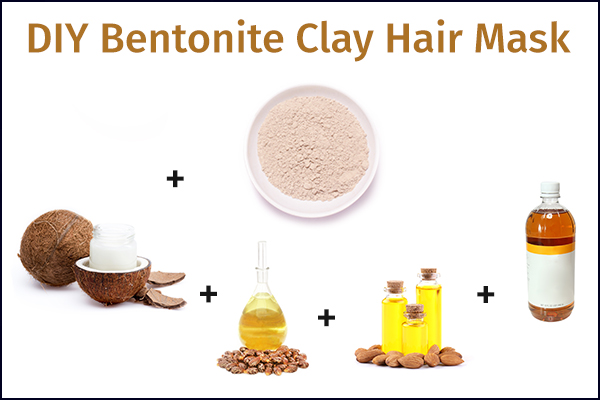
How to prepare
- Get a wooden, plastic, or glass bowl and a nonmetallic spoon to prepare this mask.
- Add ½ cup bentonite clay to the bowl.
- Pour in 1 tablespoon of coconut oil, ½ tablespoon of castor oil, and ½ tablespoon of almond oil in the bowl, and mix all the ingredients using a nonmetallic spoon.
- Add 6 tablespoons of ACV into the mix, and let it froth for 15 seconds before giving it a vigorous stir to remove any lumps.
- Let the mixture settle down for a few minutes such that it acquires a smooth, yogurt-like consistency.
- If you feel like the mask is too thick, dilute it with a bit of water. If it’s too runny, you can add a little bit of clay to thicken it. Ideally, it should be thick enough to stick to your hair and scalp.
How to use
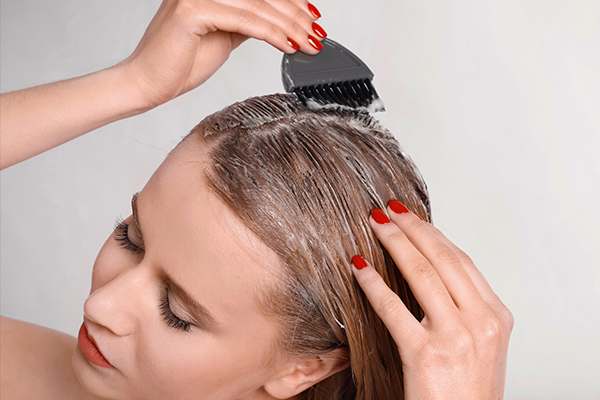
- The mask is easier to apply on damp hair, so start with a hair wash.
- Divide your moist hair into sections, and apply the mask to each of them one by one. Start from the roots and proceed to the tips.
- If your hair starts drying in the middle of this process, use a spray bottle to spritz some water on it.
- Once you are done applying the mask, roll up your hair and cover it with a shower cap.
- Leave the mask on for at least 20 minutes before rinsing it out with warm water, and shampoo if you need to.
- Apply a conditioner on the washed hair for a few minutes, followed by a final rinse.
Additional Tips
- You can add aloe vera juice, honey, olive oil, or a few drops of essential oil to the mask for added hair benefits.
- Bentonite clay reacts negatively with all kinds of metal, which lowers its effectiveness. So, you must only use wooden, plastic, or glass containers and utensils to prepare this mask.
- You can adjust the amount of ingredients according to the length of your hair.
Final Word
Bentonite clay has been widely used in beauty and hair remedies for thousands of years with successful results and no reported side effects. It is mainly acknowledged for its detoxifying properties that help draw out the impurities settled deep inside skin pores.
When incorporated in a hair mask, it can cleanse the grime, dead cells, and excess oil clogging hair follicles for healthy hair growth. The other ingredients used in the hair mask further enhance the effectiveness of the star ingredient – bentonite clay.
You may have to tweak the mask recipe according to your specific hair problem or hair type. For instance, those dealing with a greasy scalp should add more clay, those with hair or scalp dryness should consider upping their ACV ratio, and those suffering from smelly hair/scalp can camouflage the malodor by adding a few drops of fragrant essential oils.
There isn’t enough scientific evidence to confirm the benefits of a bentonite hair mask, but a lot of people who have used it have reported a marked improvement in the texture, appearance, and overall quality of their hair.
- Was this article helpful?
- YES, THANKS!NOT REALLY


